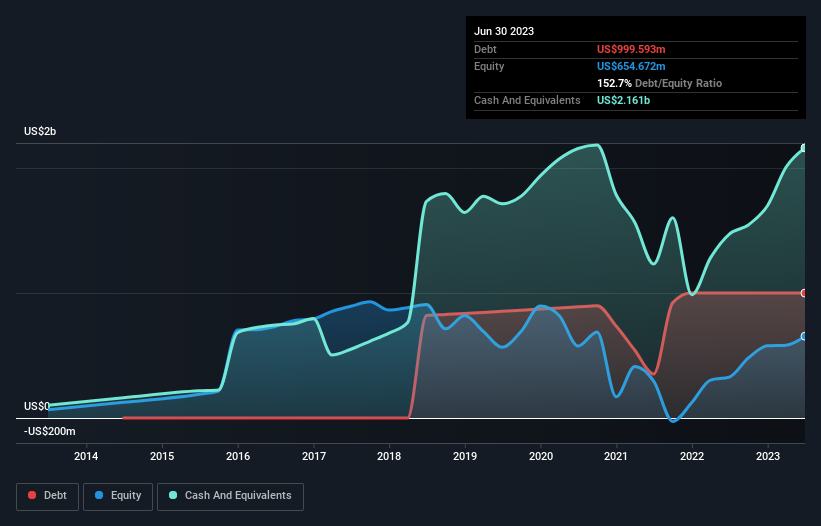
Some say volatility, rather than debt, is the best way to think about risk as an investor, but Warren Buffett famously said that 'Volatility is far from synonymous with risk.' So it might be obvious that you need to consider debt, when you think about how risky any given stock is, because too much debt can sink a company. We can see that Atlassian Corporation (NASDAQ:TEAM) does use debt in its business. But the more important question is: how much risk is that debt creating?
What Risk Does Debt Bring?
Debt is a tool to help businesses grow, but if a business is incapable of paying off its lenders, then it exists at their mercy. In the worst case scenario, a company can go bankrupt if it cannot pay its creditors. However, a more usual (but still expensive) situation is where a company must dilute shareholders at a cheap share price simply to get debt under control. Of course, plenty of companies use debt to fund growth, without any negative consequences. When we think about a company's use of debt, we first look at cash and debt together.
Check out our latest analysis for Atlassian
What Is Atlassian's Net Debt?
As you can see below, Atlassian had US$999.6m of debt, at June 2023, which is about the same as the year before. You can click the chart for greater detail. But it also has US$2.16b in cash to offset that, meaning it has US$1.16b net cash.

How Strong Is Atlassian's Balance Sheet?
The latest balance sheet data shows that Atlassian had liabilities of US$2.03b due within a year, and liabilities of US$1.42b falling due after that. Offsetting this, it had US$2.16b in cash and US$477.7m in receivables that were due within 12 months. So its liabilities total US$813.6m more than the combination of its cash and short-term receivables.
This state of affairs indicates that Atlassian's balance sheet looks quite solid, as its total liabilities are just about equal to its liquid assets. So while it's hard to imagine that the US$50.8b company is struggling for cash, we still think it's worth monitoring its balance sheet. Despite its noteworthy liabilities, Atlassian boasts net cash, so it's fair to say it does not have a heavy debt load! When analysing debt levels, the balance sheet is the obvious place to start. But ultimately the future profitability of the business will decide if Atlassian can strengthen its balance sheet over time. So if you're focused on the future you can check out this free report showing analyst profit forecasts.
Over 12 months, Atlassian reported revenue of US$3.5b, which is a gain of 26%, although it did not report any earnings before interest and tax. With any luck the company will be able to grow its way to profitability.
So How Risky Is Atlassian?
Although Atlassian had an earnings before interest and tax (EBIT) loss over the last twelve months, it generated positive free cash flow of US$842m. So although it is loss-making, it doesn't seem to have too much near-term balance sheet risk, keeping in mind the net cash. One positive is that Atlassian is growing revenue apace, which makes it easier to sell a growth story and raise capital if need be. But we still think it's somewhat risky. When analysing debt levels, the balance sheet is the obvious place to start. But ultimately, every company can contain risks that exist outside of the balance sheet. For example - Atlassian has 2 warning signs we think you should be aware of.
If, after all that, you're more interested in a fast growing company with a rock-solid balance sheet, then check out our list of net cash growth stocks without delay.
New: Manage All Your Stock Portfolios in One Place
We've created the ultimate portfolio companion for stock investors, and it's free.
• Connect an unlimited number of Portfolios and see your total in one currency
• Be alerted to new Warning Signs or Risks via email or mobile
• Track the Fair Value of your stocks
Have feedback on this article? Concerned about the content? Get in touch with us directly. Alternatively, email editorial-team (at) simplywallst.com.
This article by Simply Wall St is general in nature. We provide commentary based on historical data and analyst forecasts only using an unbiased methodology and our articles are not intended to be financial advice. It does not constitute a recommendation to buy or sell any stock, and does not take account of your objectives, or your financial situation. We aim to bring you long-term focused analysis driven by fundamental data. Note that our analysis may not factor in the latest price-sensitive company announcements or qualitative material. Simply Wall St has no position in any stocks mentioned.
About NasdaqGS:TEAM
Atlassian
Through its subsidiaries, designs, develops, licenses, and maintains various software products worldwide.
Flawless balance sheet with high growth potential.


